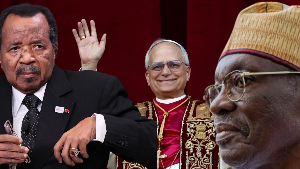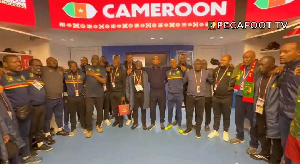Kar Kay in the Far North, two hundred kilometers from the capital of the Far North and there seems to be no end to the great expanse. The plains are unending, meeting clear blue skies in the horizon. From time to time, they are interrupted by mountains of boulders, delicately packed over each other by nature.
In September, patches of the Savanah vegetation are still brown from more than eight months of scorching sun. The rains have not been abundant this year, and most of the seasonal streams and rivers are dry. Fine white sands now lie where water should flow.
Cotton fields are beginning to flower but do not promise a bountiful harvest. Most of the millet, sorghum and corn will soon be ripe, say the farmers who cultivate them with diggers, hoes and nothing else. Teenage boys who should be in school watch as cattle and sheep feast on the little pasture that is left.
Apart from a handful of tightly populated urban centers, the rest of this region is remote, a collection of numerous clusters of round grass-roofed huts, some with less than 50 inhabitants. Beyond the paved highways, the roads are rugged at best.
Because of the sheer size of unpopulated plains and mountains, the rugged nature of the terrain and the constant movement of people, the Far North is particularly difficult to police. For years, armed gangs roamed the shrubs of the countryside, stealing cattle, slaughtering protected wildlife and kidnapping people for ransom.
But the region has never experienced the level of insecurity that has now gripped every aspect of life. Nigeria’s Islamic militant group Boko Haram has taken its bloody campaign against Western ways across the border. The group has hit border villages, stormed security outposts, and abducted tourists, missionaries and high profile individuals such the wife of the vice prime minister Amadou Ali.
As both local and central administration respond with a troop surge, a partial curfew and targeted travel restrictions fear has taken hold.
“We are at war,” said Salim Adama, a local businessman. “Sometimes you get up and just see heavily armed soldiers patrolling the streets in military tanks.”
Hundreds have fled border villages over the past few months, said Raymond Roksobo, the senior divisional officer of Mayo-Tsanaga, an administrative unit in the Mandara Mountains on the Cameroon-Nigeria border. In August, the number of internally displaced people in the division alone was about 1,500, according to administrative documents seen by the Standard Tribune.
Over the past months, Boko Haram attacks have been confined to border localities, far from heavily populated centers like Maroua. Special Forces now policing the region are succeeding to push back the armed group and preventing it from striking targets deep in the territory. In September, soldiers said they killed 100 Boko Haram militants in their most important victory in the battle.
But each time the group manages to strike, like it did again on 18 September leading to the death of six people in two separate clashes, the impact is felt throughout the region.
“When you hear that your village has been attacked, you cannot sleep,” said Moctar Mohamad, a taxi driver in Maroua. “You wonder whether your brother or sister has been killed.”
In spite of their fears, and sometimes anger, people here quickly hush up when the conversation turns to Boko Haram. Many believe security operatives have infiltrated daily life, passing for cab drivers, drinking beer in bars, sitting through evening prayers and even posing as call phone operators.
“You do not know who is in the taxi so you do not talk about Boko Haram,” said Mohamad. “People fear that if they talk about Boko Haram, they could be taken for Boko Haram followers. No one wants that.”
In interviews, officials claim things are under control. They point to the successful resumption of schools even in border communities as evidence. But on the ground, residents and humanitarian workers alike do not yet find security measures and the army’s recent successes reassuring enough. Even the military is stopping people from parts of the region they consider risky.
Aid workers who have been providing nutritional therapies to malnourished children, supporting health centres deal with malaria and helping schools put in place water and sanitation programmes have pulled out of the worst affected parts of the region. Most international organisations and NGOs have scaled back their work while insecurity persists.
“I cannot put the life of UN workers at risk,” said Najat Rochdi, the resident coordinator of UN agencies, who said millions of children had missed vital doses of vaccines because insecurity prevented aid workers from reaching them.
Western countries like the United States and France have advised their nationals not to travel to the Far North.
The army won’t give interviews. But official after official, who did not want to be named because of the sensitive nature of the subject, repeatedly said their main challenge has been getting accurate intelligence. One official said villagers with better knowledge of the terrain have now been drafted to work as the eyes and ears of the military and administration. The job of community vigilantes also includes monitoring movements and enforcing curfews.
But there are still loopholes. No matter how hard the army tries, they cannot watch over every inch of the border at all times, official admit.
Nevertheless, military sources said it has become harder for Boko Haram militants to walk across the border and back as they did in the past. New commanders were recently posted to the region. Motorised units posted along the border can respond more rapidly, and are often well-armed.
“We have our finger wrapped around this,” said an officer, who cannot be identified because he was not cleared to talk to the media. “It may take long but we will [eventually] win.”
Opinions of Friday, 26 September 2014
Auteur: Standard Tribune














